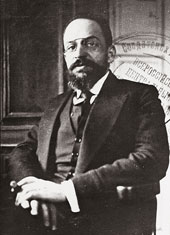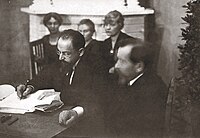Adolf Abramowitsch Joffe
Adolph Joffe ( Russian Адольф Абрамович Иоффе , born October 10 . Jul / 22. October 1883 greg. In Simferopol ; † 16th November 1927 in Moscow ) was a Russian-Soviet revolutionary and comrade Leon Trotsky .
Life
Joffe came from a wealthy Jewish or Karaite family. His father owned the entire postal and passenger transport network in the Crimea , owned a house in Moscow, and had close ties to the Russian politician and temporary head of government Sergei Witte .
Joffe was involved in revolutionary activities from an early age. At the age of 19 he became a member of the RSDLP . After graduating from high school, he traveled to Berlin , where he was enrolled at the Medical Faculty of the Friedrich Wilhelms University . There he met the Austrian psychiatrist Alfred Adler , from whom he was later treated psychoanalytically in Vienna , and became interested in Freud's teachings . In 1905 he returned to Russia and took part in the revolution. After it was defeated by the tsarist government, he went into exile in Germany , from where he was expelled as an “undesirable person”, and then to Austria . In 1908 he completed his training as a doctor in Vienna . There he met Leon Trotsky, whose friend and companion he became. Together they published the Russian-language newspaper Pravda (Truth) from 1906 to 1912 , which should not be confused with the later governing body of the Communist Party of the Soviet Union. In 1912 he was arrested while in Russia in Odessa and exiled to the Tobolsk Governorate . In 1913 his involvement in the work of the illegal organization of sailors of the Black Sea Fleet in the early years was known. He was arrested again and came to Odessa, where he was sentenced to life in Siberia after a trial in 1916 . There he worked as a village doctor.
In 1917 Joffe fled Siberia and took part in the preparation of the October Revolution by becoming a member of the so-called "small central committee" of the Bolsheviks, whose task was to plan the armed uprising in Petrograd and Moscow. From August 19, 1917 to March 8, 1918 Joffe was one of the first secretaries of the Central Committee of the RSDLP (b) and at the same time a candidate for the Central Committee of the RSDLP and later for the RKP (b ).
Joffe was from November 1917 to January 1918 head of the Soviet delegation at the peace negotiations in Brest-Litovsk before he was replaced by Trotsky. After Trotsky's appointment as People's Commissar for Warfare, he temporarily replaced him as People's Commissar of Foreign Affairs. In April 1918 he was appointed Soviet representative (ambassador) in Germany, where he worked with the future head of the Soviet secret police OGPU , Vyacheslav Menschinsky . At the beginning of November, Joffe was expelled along with all the Soviet embassy staff on charges of preparing for an uprising and subversive activity.
On February 2, 1920 he signed the Dorpat Peace Treaty between Estonia and Soviet Russia .
In 1920 he represented the Soviet Russian side in the Peace of Riga , which led to the recognition of Latvia by the RSFSR . In 1922 he was a member of the Soviet Russian delegation at the Genoa Conference and was involved in the conclusion of the Treaty of Rapallo . From 1922 to 1924 he was ambassador to China and conducted several negotiations in Tokyo , where he expressed his wish to take a Japanese garden with him to Moscow as a present for Lenin . Lenin's illness, however, thwarted this plan. In Japan, Joffe fell seriously ill and had to break off negotiations. He returned to Soviet Russia for treatment, and after his health improved he went first to Great Britain for a short time and then to Austria as ambassador . The death of Lenin was a heavy blow for Joffe. According to his daughter, she saw him crying for the first and last time in her life. In 1926 his health deteriorated so much that he had to resign from his duties.
He worked on the State Committee on Concession Matters and taught at the Moscow State University at the Chair of International Relations. He has authored several books on the foreign policy of Soviet Russia. Joffe remained a loyal supporter of Leon Trotsky and committed after its loss of power and expulsion from the Communist Party as a sign of protest on 16 November 1927 suicide . Joffe's grave was destroyed during the Stalinist purges and was not rebuilt by his daughter until 1956.

Joffe's daughter Nadeschda Joffe (1906–1999) survived the Stalinist purges and wrote a report published in the 1990s about her own fate and that of her father.
literature
- Leon Trotsky: The real situation in Russia. Avalun-Verlag, Hellerau near Dresden 1931, chapter The last words of Adolf Joffes
- Maria Joffe: One Long Night: A Tale of Truth . New Park Publications 1977 ISBN 0-902030-93-0
- Nadeschda A. Joffe: Flashback. My life, my fate, my era . Essen 1997 ISBN 3-88634-063-5 ( reviews )
- Nadeschda A. Joffe: AA Ioffe: revoljucioner i diplomat , in: Novaja i novejsaja istorija, No. 3, 1990, pp. 94-103.
- Article Adolf Abramowitsch Joffe in the Great Soviet Encyclopedia (BSE) , 3rd edition 1969–1978 (Russian) , ( English )
Web links
- Newspaper article about Adolf Abramowitsch Joffe in the press kit of the 20th century of the ZBW - Leibniz Information Center for Economics .
| predecessor | Office | successor |
|---|---|---|
| ? |
Soviet ambassador to China 1922–1924 |
? |
| ? |
Soviet Ambassador to the United Kingdom in 1924 |
? |
| Voldemar Christianowitsch Aussem |
Soviet ambassador to Austria 1924–1925 |
Jan Antonowitsch Bersin |
| personal data | |
|---|---|
| SURNAME | Joffe, Adolf Abramowitsch |
| ALTERNATIVE NAMES | Иоффе, Адольф Абрамович (Russian) |
| BRIEF DESCRIPTION | Russian-Soviet revolutionary and companion of Trotsky |
| DATE OF BIRTH | October 22, 1883 |
| PLACE OF BIRTH | Simferopol |
| DATE OF DEATH | November 16, 1927 |
| Place of death | Moscow |

